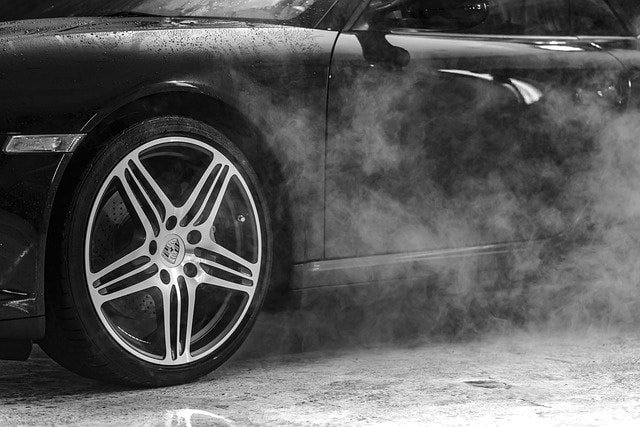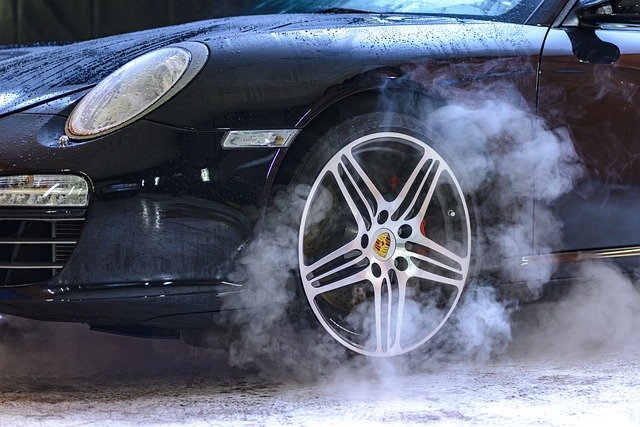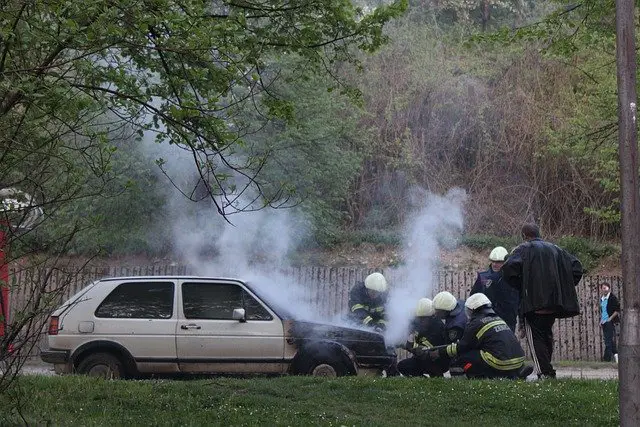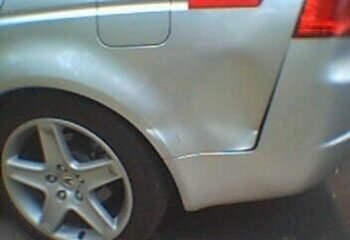If you’re a car owner, the last thing you want to find out is that your vehicle has an issue. One of the more common issues that can arise with cars is a burning smell coming from within, but without any signs of overheating.
While this may sound like an intimidating problem at first, understanding what causes it and how to troubleshoot it will help you take control and get back on the road in no time! In this blog post, we explore potential causes for the smell as well as steps to fix it so make sure to read through until the end.
What's in this post?
7 Reasons Of Burning Smell from Car but Not Overheating And Solusion
1. Overheating or Slipping Drive Belt
Imagine you’re cruising down the road when suddenly your car lets out an alarming combination of unfriendly sounds – loud slapping, squealing, or knocking noises emanating from the very depths of your vehicle. Coupled with an unmistakable scent of burning rubber, you immediately know that something is amiss under the hood.
In a majority of cases, the culprit behind these sensory disturbances is a locked accessory connected to the drive belt or serpentine belt, which could include the generator, air pump, water pump, A/C compressor, or even the A/C compressor clutch.
When one of these essential accessories becomes frozen, it forces the belt to rotate over a static pulley, generating friction that produces that telltale burning smell.
Sometimes, a simple misaligned pulley can also trigger this series of events. The solution? Routinely check your drive belt every six months, replacing any faulty belts as needed to keep your car running smoothly and safely free from these alarming issues.

2. Car Smells from Clutch
If you’ve ever noticed a burning smell from your car, similar to rubber or newspaper, it’s time to take notice and pay attention to your vehicle’s health, as this could indicate a problem with your clutch.
As a crucial component in your car, the clutch plays a vital role in the overall performance of your automobile. It is responsible for transferring the rotational power generated by the engine to the drivetrain, which ultimately allows your car to speed up and slow down without shutting off the engine.
The burning smell you may occasionally experience while driving is often caused by the clutch slipping against the flywheel. This typically transpires when the release of the clutch pedal is too slow, generating friction and heat which leads to the unmistakable aroma.
Interestingly, maintaining a poor driving position can significantly contribute to this issue by unintentionally resting your left foot on the clutch pedal. Such a simple error, driven by comfort or habit, can not only produce an unpleasant sensory experience but can also impact the overall lifespan and efficiency of your vehicle’s clutch system.
Regular clutch maintenance goes hand-in-hand with learning proper clutching and shifting techniques, and becoming familiar with these methods has the potential to extend the life of your vehicle’s clutch.
Be sure to have a professional inspect your clutch to confirm its wear and determine if it requires any repairs. If you are a beginner, or even if you’ve been driving a manual transmission car for some time, it’s always helpful to brush up on your clutching and shifting fundamentals.
To minimize leg fatigue and make a smoother clutching experience, adjust your driving position so you have adequate legroom, and avoid riding the clutch, as this can lead to premature wear and unnecessary replacement.
Additionally, always fully disengage and re-engage the clutch when changing gears, and when releasing the clutch, do so close to the engine speed to facilitate a smoother transition between gears. By keeping these practices in mind, you’ll ultimately ensure a better overall driving experience as well as prolong the life of your clutch.
3. Smell from Heater
The moment you catch that distinct whiff of burning plastic wafting through the air, it is essential to do a thorough check of the heater. A rarely-used heater could be the culprit, with built-up dust and debris responsible for the choking scent.
If, however, the smell persists even after consistent heater use, there may be some larger particles or obstructions blocking the vent – including plastic bags and other foreign objects lodged in the engine.
Suppose your investigative efforts don’t reveal any such clogs. In that case, it’s time to gauge whether the heater itself is to blame, as a broken heater can leak antifreeze into the vents and generate a burning plastic scent. More troubling still, it’s possible that certain heater components have either melted or become damaged, a scenario often encountered with heater motors.

When you notice the smell in your car becoming stronger, and there’s no debris attached to the vent, it’s essential to take immediate action. Don’t wait any longer and head to your nearest mechanic to have them investigate the issue.
They will thoroughly inspect your vehicle, including the heater, fuel lines, and other potentially affected components. In addition, they will assess the state of your car’s air filters and clean or replace them if necessary. You may even consider using an antibacterial solution to cleanse the vents, ensuring a fresh and safe driving environment.
4. Short Circuit Or Burnt Wire
The burning aroma of electrical components engulfing your vehicle’s interior is not only alarming, but it is also indicative of a fairly common issue—electrical shorts. Normally, the heat produced by electrical currents is safely enclosed within the wiring and associated parts.
However, once a short in the system surfaces, the intense heat becomes trapped in a single area, gradually compromising the integrity of surrounding plastic and other constituents.
This destructive process leads to the emanation of that unmistakable burning smell. What makes electrical shorts dangerous is their propensity to affect more flammable components, sparking a fire or causing irreparable harm to adjacent wiring.
Identifying and addressing the cause of such electrical problems promptly can avert catastrophic outcomes and ensure a safer driving experience.
5. Leaking Coolant and Burn
A whiff of a sweet burning smell from your car’s air conditioning system can be quite disconcerting as it may indicate that coolant is leaking in the cooling system.
This not only poses a potential risk to the functioning of your car but also exposes you to ethylene glycol – a harmful chemical present in coolant. It’s crucial to acknowledge this underlying issue and have it addressed promptly, as ingesting or coming in contact with ethylene glycol can be detrimental to your health.
So, the next time you catch a sweet burning scent wafting through your car’s A/C, do not overlook it – ensuring your car’s cooling system is operating safely is paramount for both your health and your vehicle’s efficiency.
For instance, fixing or replacing a damaged coolant hose can be quite affordable, falling within an average price range of $130-$160 for parts and labor. On the other hand, tackling a problematic head gasket may be both time-consuming and expensive, setting you back at least $1000 in total. Being vigilant about the state of your coolant system will not only save you from costly repairs but also maintain your engine’s optimal condition.
6. Oil Burn: Old Oil Or Leak

The unmistakable scent of burning oil wafting from your car can be a worrisome experience, especially when accompanied by blue-tinted smoke emanating from the tailpipes. Often, this troubling scenario can be attributed to old engine oil and an overused oil filter that have not been replaced in a timely manner.
Regular maintenance, such as oil and oil filter changes, is crucial in preventing this type of situation from occurring. However, it’s also important to be aware of another culprit that could be responsible for these symptoms: leaking engine oil.
When engine oil leaks into the exhaust pipe, it not only emits white smoke but also creates that familiar burning smell.
The anxiety-inducing combination of a burning oil smell and white smoke should never be ignored, as this could signal a significant issue with your vehicle’s engine. When faced with these symptoms, it is crucial to locate the source of the leak or promptly take your car to a professional auto shop for troubleshooting.
Repairing an engine oil leak can be a labor-intensive endeavor, with costs ranging from $150 to as high as $2,000, depending on your vehicle’s make and model.
Valve cover gasket replacements are often the least expensive option, while more intricate procedures, like replacing a camshaft seal, involve the removal of vital components such as timing belts and other accessories. Unfortunately, sometimes, the most costly repair job is inevitable – a total head gasket replacement.
7. Brake Pads And Rotors
The unmistakable smell of burning under carpet can be quite disconcerting, especially when it’s coming from your car as you drive along. This odor often happens when brake pads are used heavily, such as when going down steep hills with the brakes continuously applied.
Another situation that can lead to this foul-smelling problem is a caliper piston seizing up, which can cause the brakes to drag and create that burning smell. To avoid such situations, it is crucial to have your braking system regularly inspected, ensuring that all parts are in good shape and functioning correctly.
Additionally, practicing safe driving habits, such as maintaining a safe distance from other vehicles, can help you avoid slamming the brakes suddenly, which may contribute to the issue.
Lastly, don’t forget to replace your brake fluids periodically, particularly with older vehicles, as this can significantly increase your brakes’ longevity and overall performance.
Conclusion
The burning smell from car but not overheating can be a cause for concern, but it’s important to have it looked at by a reputable and experienced mechanic to ensure that there are no underlying problems.
In most cases, the smell is nothing to worry about as long as the car isn’t overheating or showing any other signs of trouble. Additionally, if you’re diligent in checking your engine oil and coolant levels when you pump gas, you can help prevent any smells coming from your car in the future.
Ultimately, if you believe something is wrong with your car, don’t hesitate to have it looked at by a qualified individual and get back on the road safely.





